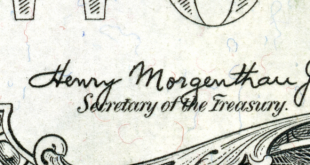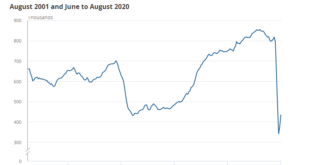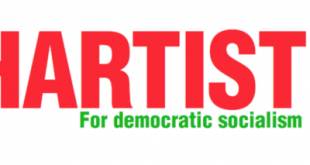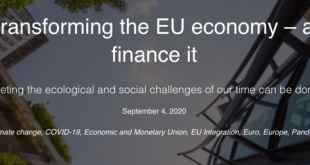On Wednesday (30 September) the Office for National Statistics published its second estimate of GDP for the second quarter of 2020, April to June. The very marginally positive news is that the fall, between Q1 and Q2, was reduced from 20.4% to 19.8%. Since this was still the largest recorded quarterly fall since records commence in 1955, this is hardly a cause for jubilation – and even less so since the Q1 drop was raised from -2.2% to -2.5%. As we discuss below, the position would...
Read More »UK GDP – the Q2 close-down, and the distorting effect of ‘imputed rental’
On Wednesday (30 September) the Office for National Statistics published its second estimate of GDP for the second quarter of 2020, April to June. The very marginally positive news is that the fall, between Q1 and Q2, was reduced from 20.4% to 19.8%. Since this was still the largest recorded quarterly fall since records commence in 1955, this is...
Read More »How to transfer power away from markets and to democratically elected governments.
This article was written in July, 2020 for Project Syndicate where it was finally published on 1st October, 2020. The global economy suffers from dangerous imbalances. Economic goals for endless ‘growth’ lead to rises in heat-trapping gases that conflict with the earth’s limited capacity to manage rising toxic emissions. Urbanisation, pollution, soil erosion, deforestation, depletion of wildlife, degradation of marine ecosystems – these and other economic activities disturb...
Read More »How to transfer power away from markets to democratically elected governments
This article was written in July, 2020 for Project Syndicate where it was finally published on 1st October, 2020. The global economy suffers from dangerous imbalances. Economic goals for endless ‘growth’ lead to rises in heat-trapping gases that conflict with the earth’s limited capacity to manage rising toxic emissions. Urbanisation, pollution, soil erosion, deforestation, depletion of wildlife, degradation of marine ecosystems – these and other economic activities disturb the equilibrium...
Read More »How to transfer power away from markets to democratically elected governments
This article was written in July, 2020 for Project Syndicate where it was finally published on 1st October, 2020. The global economy suffers from dangerous imbalances. Economic goals for endless ‘growth’ lead to rises in heat-trapping gases that conflict with the earth’s limited capacity to manage rising toxic emissions. Urbanisation, pollution, soil erosion, deforestation, depletion of wildlife, degradation of marine ecosystems – these and other economic activities disturb the equilibrium...
Read More »This time, Mr Sunak has got it wrong
Till now, I have supported much of what Chancellor Rishi Sunak has put in place, as measures to help the economy through the pandemic. The furlough scheme has proved its worth. But today’s measures are inadequate and disappointing. The new Job Support Scheme, under which the government will pay some 22% of the wages of employees...
Read More »This time, Mr Sunak has got it wrong
Till now, I have supported much of what Chancellor Rishi Sunak has put in place, as measures to help the economy through the pandemic. The furlough scheme has proved its worth. But today’s measures are inadequate and disappointing. The new Job Support Scheme, under which the government will pay some 22% of the wages of employees who work at least one third of their usual hours. This compares with the 60% of wages to be paid by the government in October, the last month of the furlough...
Read More »On the Green New Deal – for The Chartist magazine
Nigel Doggett and Mike Davis of The Chartist magazine spoke to Ann Pettifor about why a Green New Deal is central to our recoveryPublished 20 September, 2020. How do you see the GND playing out against the Covid crisis?There are two roads to travel. One is the progressive one in which our leaders wake up to the scale of the climate threat and decide they are going to prepare. There are signs of that happening: little things like the French deciding to abolish burners in...
Read More »On the Green New Deal – for The Chartist
Nigel Doggett and Mike Davis of The Chartist magazine spoke to Ann Pettifor about why a Green New Deal is central to our recovery Published 20 September, 2020. How do you see the GND playing out against the Covid crisis? There are two roads to travel. One is the progressive one in which our leaders wake up to the scale of the climate threat and decide they are going to prepare. There are signs of that happening: little things like the French deciding to abolish burners in Paris streets. But...
Read More »Radically Transforming the EU Economy – and how to finance it
September 4, 2020The following article appeared on Progressive Post, the website of the Foundation of Progressive European Studies (FEPS)Today’s capitalism cannot tackle climate breakdown and cannot prevent the loss of biodiversity. It considers work as a cost to be minimised, to the detriment of the economy and the social meaning of work.High rates of return on capital (interest) require ever-rising extraction of the earth’s finite assets and the felling of its biodiverse...
Read More » Prime, Policy Research in Macroeconomics
Prime, Policy Research in Macroeconomics






